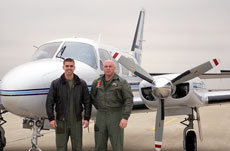Students explore pilot program at Willard

Online Poster
February 10, 2005
While some students spent Tuesday with their heads in the books, others had their thoughts in the clouds.
U.S. Marine officers came to Willard Airport to put students and prospective recruits behind the wheel of a Piper Navajo Chieftain. The officers travel around the Midwest in the twin-engine plane visiting college campuses and giving students a chance with the controls.
About 20 students went to Willard airport in hopes of flying with the marines for the day, but cloudy skies kept the plane grounded. Still, the students were able to sit behind the wheel of the seven-seater and ask the officers about flying with the Marines.
Erik Gutierrez, senior in engineering, went to the airport to see the plane and talk with the officers, but said he was disappointed he did not get to leave the ground.
“I really wanted to get behind the wheel and see how it feels,” Gutierrez said. “I wanted to get up in the sky.”
Get The Daily Illini in your inbox!
Officer Bryan Hill, assistant for aviation officer procurement, said marine pilots have been traveling around in the Piper Navajo talking about the pilot program and taking people into the sky for at least eight years.
“The program is designed to get (the marine pilot program) out there,” said Officer Matt Beckett, assistant for aviation officer procurement.
Beckett said many people do not think of the marines as pilots. He said most people think of the marines as only ground troops, but he estimated that about one-third of the 25,000 marine officers are pilots.
Beckett said Marines must go through Officer Candidate School in order to become a marine pilot. Students can drop out of the program at any time if they decide it is not what they want. Once a student completes the program, helicopter pilots have a six-year service time, and jet pilots spend eight years in service.
Marine ground officers have a three and one-half year service time, but Beckett said the extra training required for pilots accounts for the extended service time.
Gutierrez said the time commitment is one reason why he might not consider the marine program.
“I’d like to be flexible with my job options after college,” he said.
Beckett said that although some aviation students come to learn about the program, it also attracts individuals with little knowledge of planes.
“Many people have no experience whatsoever,” he said. “Most have never been on a plane except for the Southwest-type commercial jet.”
Gutierrez said he is very interested in flying.
“I will definitely, after school, get at least a private pilot license,” he said.
Beckett and Hill said they enjoy traveling to campuses, explaining the program and talking about flying.
Hill said the best part is talking to the people.
“We make it fun,” Beckett said. “You see most people behind the wheel just smile from ear to ear.”






